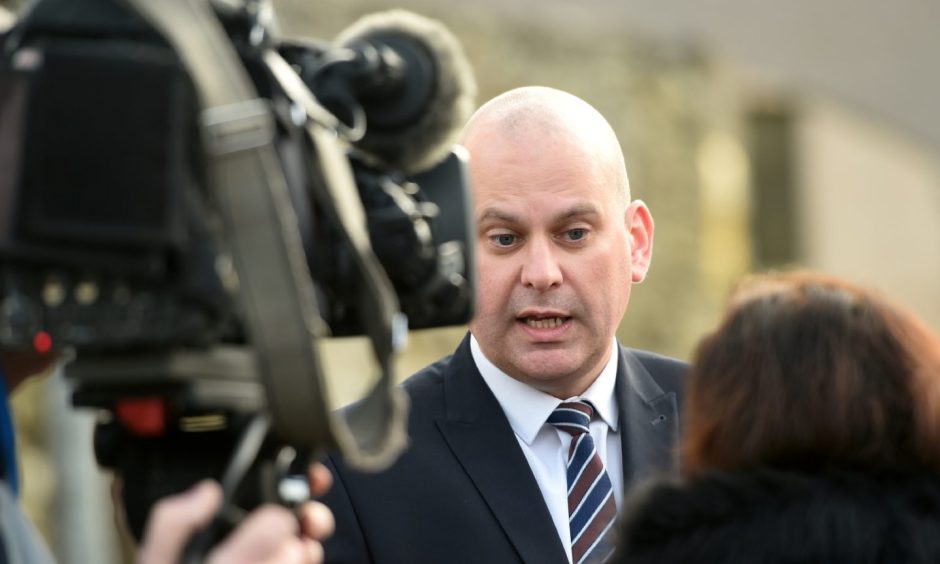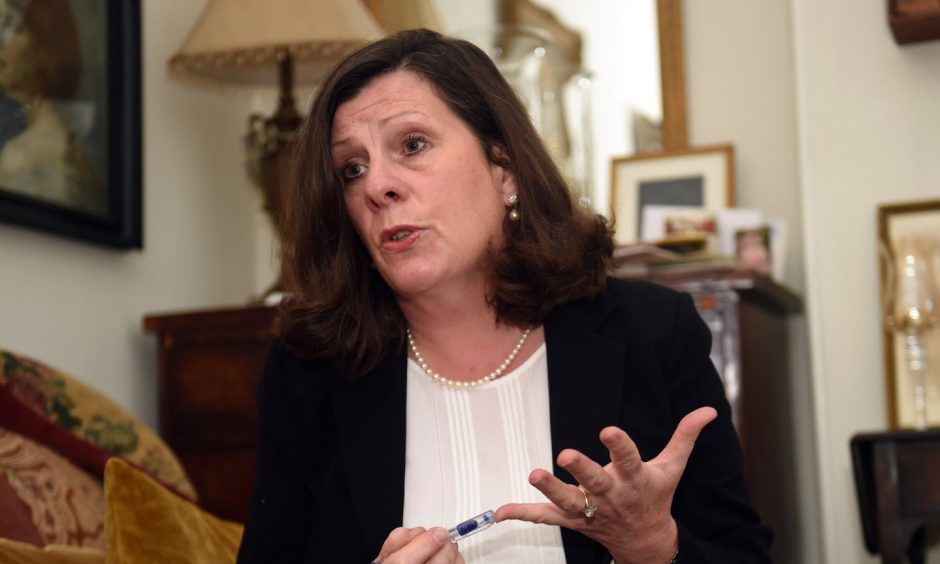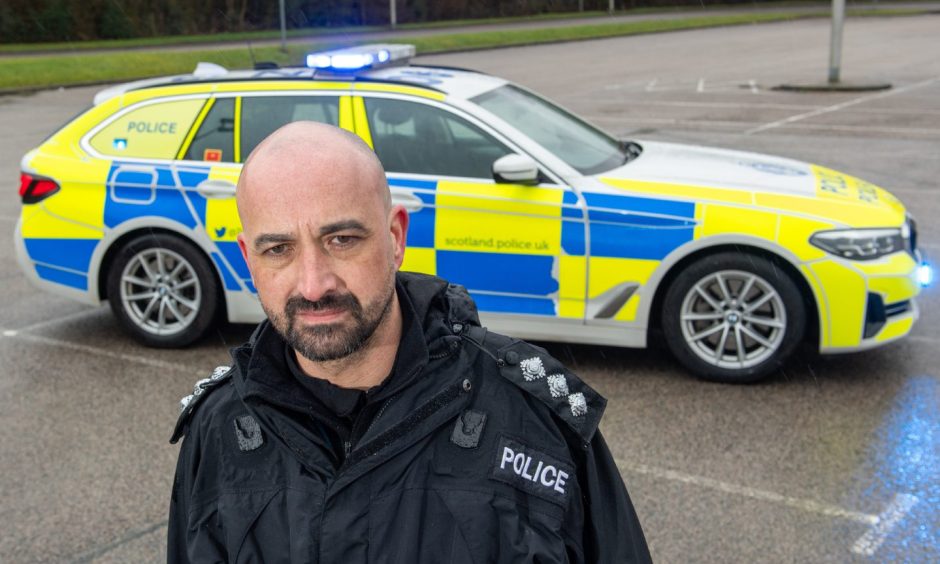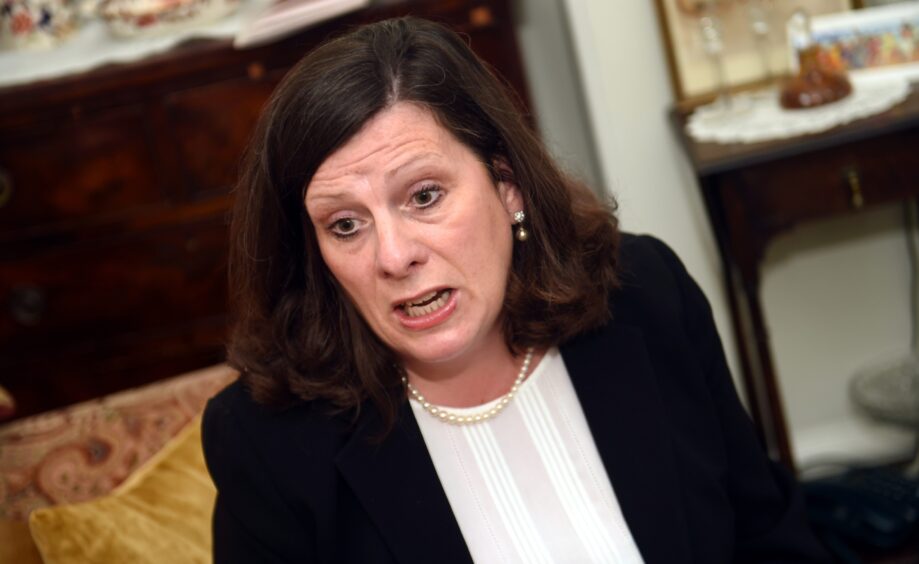North-east police chiefs have hit back after being quizzed on whether hypothetical situations in a councillor’s kitchen would be deemed a hate crime.
A controversial new law came into force on April 1 making it illegal to stir up hatred against people with protected characteristics.
Chief Superintendent Graeme Mackie and Chief Inspector Darren Bruce were questioned on various possible examples of breaches as Aberdeen councillors sought to clarify aspects of the new rules.
Councillor Mrs Jennifer Stewart later continued talks with officers after the communities, housing and public protection committee meeting concluded.
She claimed that Ch Insp Bruce told her he felt “ridiculed” by her line of questioning during the public talks.
The queries included whether “bantering” with her husband for being English over dinner would end up in a visit from his officers…
What is the new hate crime law in Scotland all about?
The new legislation creates an offence of stirring up hatred against people on account of their age, disability, religion, sexual orientation and gender identity.
A similar law has been in force for decades to protect victims of racial hatred.
The Aberdeen councillors’ questions came four days before north-east police would begin enforcing it.
Speaking ahead of its launch, Ch Supt Mackie said: “The legislation comes in on April 1, so from my perspective we can have an understanding of what it might look like.
“But I don’t think it’s particularly helpful to comment on things when we don’t know what’s going to happen round the corner.”
The north-east area commander added he was “more than happy” to report back on the law in a “proper time frame” to update councillors on how it was impacting policing.
“At that point (November) perhaps the question is easier answered, rather than what it might look like,” he added.
But their promise of a six-month wait for information about the new hate crime law – publicly opposed by the likes of author JK Rowling, Twitter/X owner Elon Musk and football pundit Ally McCoist – did not satisfy some of those at the Town House.
Opponents have raised concerns it could criminalise free speech, even – according to Councillor Mrs Stewart – in their own home.
However, the law does recognise the human right to express ideas that “offend, shock or disturb”.
When he was justice secretary, First Minister Humza Yousaf said no one would be found to have stirred up hatred “for solely stating their belief – even if they did so in a robust manner”.
Aberdeen police highlight ‘myths and untruths’ of the new Hate Crime Act
During the meeting – which is an opportunity for councillors to scrutinise police rather than on knowledge of incoming laws yet to impact city patrols – Labour councillor Deena Tissera, who was taunted as a “New Scot” during a council debate last year, asked if that jibe would count as a hate crime.
Twice she pressed the police chiefs: “Would that constitute an offence as stirring up racial hatred under the new act?”
Ch Insp Bruce highlighted “many myths and untruths” about the new hate crime law.
He added: “As this is a new piece of legislation, there are going to be times when this is open to interpretation.
“And in the north-east and right throughout Scotland, we want to ensure our interpretation is that which best helps people who are vulnerable to abuse and potentially targeted.
“Coming back to the question you have asked, my opinion is no because the key element within the new legislation is stirring hatred which asks that we look at whether the intention behind it is to incite others to target an individual or groups.”
But he explained that an officer’s individual take on the new hate crime act was not “the only opinion that counts” as police experts were on hand to scrutinise the launch of the law.
After Ms Tissera’s second attempt, public protection convener Miranda Radley said it was “not appropriate” to pursue her “very specific matter” during the public meeting.
Aberdeen police probed on ‘hypothetical’ hate crime
At that point Ch Supt Mackie offered: “The Scottish Government website has got some really useful helpful information around about the new hate crime legislation.
“I would expect that question could be answered by referring to that legislation.”
He offered to “signpost” councillors to the site, and to make his officers available to discuss the “nuance” with them.
“I wonder if it would be helpful of some examples of what would be cited as hate crime,” Councillor Mrs Jennifer Stewart then added.
“Because I could innocently say something like…. let’s say my husband is…”
There was a sharp intake of breath among members at this.
The Hazlehead, Queen’s Cross and Countesswells independent – who last year added the “Mrs” to her council title as a stance to “protect her gender” – was then interrupted by convener Radley, who said: “I would encourage you not to say something potentially…”
But Councillor Mrs Stewart replied: “If we can’t speak freely then we are in great fear of losing democracy. And this worries me.”
‘Could I be seen as trying to incite hate by saying ‘You’re saying that because you’re English’ in my kitchen?’
She added: “So this is my ownership about my husband. If I said to him something like: ‘You’ve just said that because you’ve an English background’ – is that classified as hatred?
“Or if I then said: ‘You said that because you’ve got a French background. You French would think that we can’t cook here’.”
She stressed that she had spoken to people who were worried quips made at a dinner party “could be a hate crime”.
The councillor added: “It’s actually, I won’t say it’s ‘banter’… it’s conversation.
“Is that inciting? And I’m not being flippant. I’m following through what lots of people are talking about in their home.
“A constituent said this week: ‘I can’t even say that. I will be arrested if I say that.’ And I thought… really?!
“I would like the police to answer: Could I be seen as trying to incite hate by saying ‘You’re saying that because you’re English’ in my kitchen?
Aberdeen police: Read the ’emotive’ Hate Crime Act for yourself
Committee convener Radley then turned to Ch Insp Bruce, who encouraged everyone to read the law for themselves.
“It is quite an emotive subject and probably the most discussed bit of legislation we’ve had in the 30 years that I can remember,” he said.
“It would answer some of the questions we have been faced with today.”
Senior Aberdeen police officer declines to comment on claims he felt ‘ridiculed’ by Hate Crime Act quizzing
Councillor Mrs Stewart then went round to where the two police chiefs were sitting, to ask for an email address where she could follow up on her concerns.
It was during a break in the proceedings that Councillor Mrs Stewart claimed Ch Insp Bruce told her he felt she had “ridiculed” him with her line of questioning.
Later, Councillor Mrs Stewart abruptly broke off discussions with the officers outside the meeting and told them she would raise her concerns with The P&J instead.
“Ch Insp Bruce said he felt ridiculed as a human being. The conversation continued in that vein,” she later told us.
“For them to want to take questions offline, it’s because they don’t know the answers,” she claimed.
Police Scotland was asked to comment on that specific claim about feeling “ridiculed”, but declined.
North-east police commander: ‘It’s not appropriate to speculate on hypothetical scenarios’
Responding to the councillor’s criticisms, Chief Superintendent Mackie told The P&J: “I welcomed the chance to be scrutinised on policing for Aberdeen and the north-east.
“We answered additional questions about the Hate Crime Act, however it was not the appropriate forum to discuss the legislation in detail and I offered to speak to members separately.
“It was also not appropriate to speculate on hypothetical scenarios and I have written to the chair of the committee seeking a meeting to discuss these concerns.”






Conversation